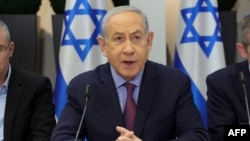The Biden administration appears unswayed from its emerging vision for a postwar Gaza Strip despite Israeli Prime Minister Benjamin Netanyahu’s rejection Thursday of a key element of that plan — the establishment of a Palestinian state.
The White House hopes at the same time to broker a normalization of relations between Israel and Saudi Arabia, a long-sought prize with broad economic and security implications for the region.
But Netanyahu turned his back on the scheme at a nationally broadcast news conference Thursday, insisting on Israeli security control over all of what now comprises the Palestinian territories.
"This collides with the idea of sovereignty," he said. "What can you do?"
National Security Council spokesman John Kirby brushed off the remark.
"This is not a new comment by Prime Minister Netanyahu. We obviously see it differently," he said to reporters Thursday onboard Air Force One. "We believe that the Palestinians have every right to live in an independent state with peace and security."
Netanyahu said he had informed the Biden administration of his position, highlighting deep divisions between the Israeli government and the staunchest backer of its military campaign against Hamas in the Palestinian enclave.
Washington has urged Israel to scale back its offensive, which has killed more than 24,000 people in Gaza, according to the Hamas-run Gaza Health Ministry. The October 7 attack by Hamas killed 1,200 people in Israel — the bloodiest episode for Israel in the decadeslong conflict.
Biden administration officials have been increasingly public with their pressure on Israel, with U.S. Secretary of State Antony Blinken warning that without a pathway to a two-state solution, Arab countries won't be involved in rebuilding Gaza.
"If Israel wants its Arab neighbors to make the tough decisions necessary to help ensure its lasting security, Israeli leaders will have to make hard decisions themselves," Blinken told reporters in Tel Aviv after meeting with the Netanyahu war Cabinet earlier this month.
Israel-Saudi normalization
The U.S.-Israel rift comes as more details emerge about the Biden administration's push for a normalization agreement between Israel and Saudi Arabia in exchange for a pathway toward Palestinian statehood.
"The strategy post-October 7 is that we want to see normalization [between Israel and Saudi Arabia] tied to a political horizon for the Palestinians," White House national security adviser Jake Sullivan said this week at the World Economic Forum in Davos, Switzerland. "As we respond to this crisis, we are actively pursuing a pathway to normalization and integration with our regional partners."
Washington has been working on the framework since before the October 7 attacks, avoiding direct negotiations between Israelis and Palestinians but pushing for a regional deal instead. The approach is an extension of the Trump administration's Abraham Accords that secured normalization with some Arab states. Biden's approach, however, adds a political horizon for Palestinians.
U.S. officials and lawmakers have met with Saudi Crown Prince Mohammed bin Salman in recent weeks with the same goal of reaching a framework to end the Israel-Hamas war and work toward Palestinian self-governance in Gaza.
Sullivan laid out four principles guiding the U.S. vision for a postwar Gaza: that the Palestinian enclave never again become a launch pad for terror attacks on Israel; peaceful relations between Israel and its Arab neighbors; an independent Palestinian state; and security assurances for Israel.
Possible exit strategy?
Netanyahu and far-right members of his government have for months dismissed the idea of a Palestinian state. Some, including National Security Minister Itamar Ben-Gvir and Finance Minister Bezalel Smotrich, are advocating for full control of Gaza and the expulsion of Palestinians.
However, with the military campaign costing Israel an estimated $220 million a day and waning international support, Netanyahu may be looking for an exit strategy.
Normalization could be seen as a political win for the embattled prime minister, who is facing corruption trials and charges of sidestepping accountability for failing to prevent the attack by Hamas despite warnings from Israeli intelligence.
"It could provide some cover,” said Virginia Page Fortna, a professor of U.S. foreign and security policy at Columbia University whose research focuses on the postwar durability of peace.
"But the signs I have seen are that he has no incentive to try to end the war quickly," she told VOA. "It's really the U.S. pressure that would be making a difference, not the carrot of normalization."
While Riyadh keeps its eye on what it considers the prime reward for normalization — a defense treaty with the U.S. to protect it against Iran — the kingdom has suspended normalization talks as images of mounting Palestinian deaths inflame the Arab world.
Also from Davos, Saudi Foreign Minister Prince Faisal bin Farhan said that while his country is still interested in a normalization deal, it "can only happen with a Palestinian state" and that a cease-fire is a "starting point for peace."
Washington remains opposed to various international calls for a cease-fire in Gaza, saying it will allow Hamas to regroup.















